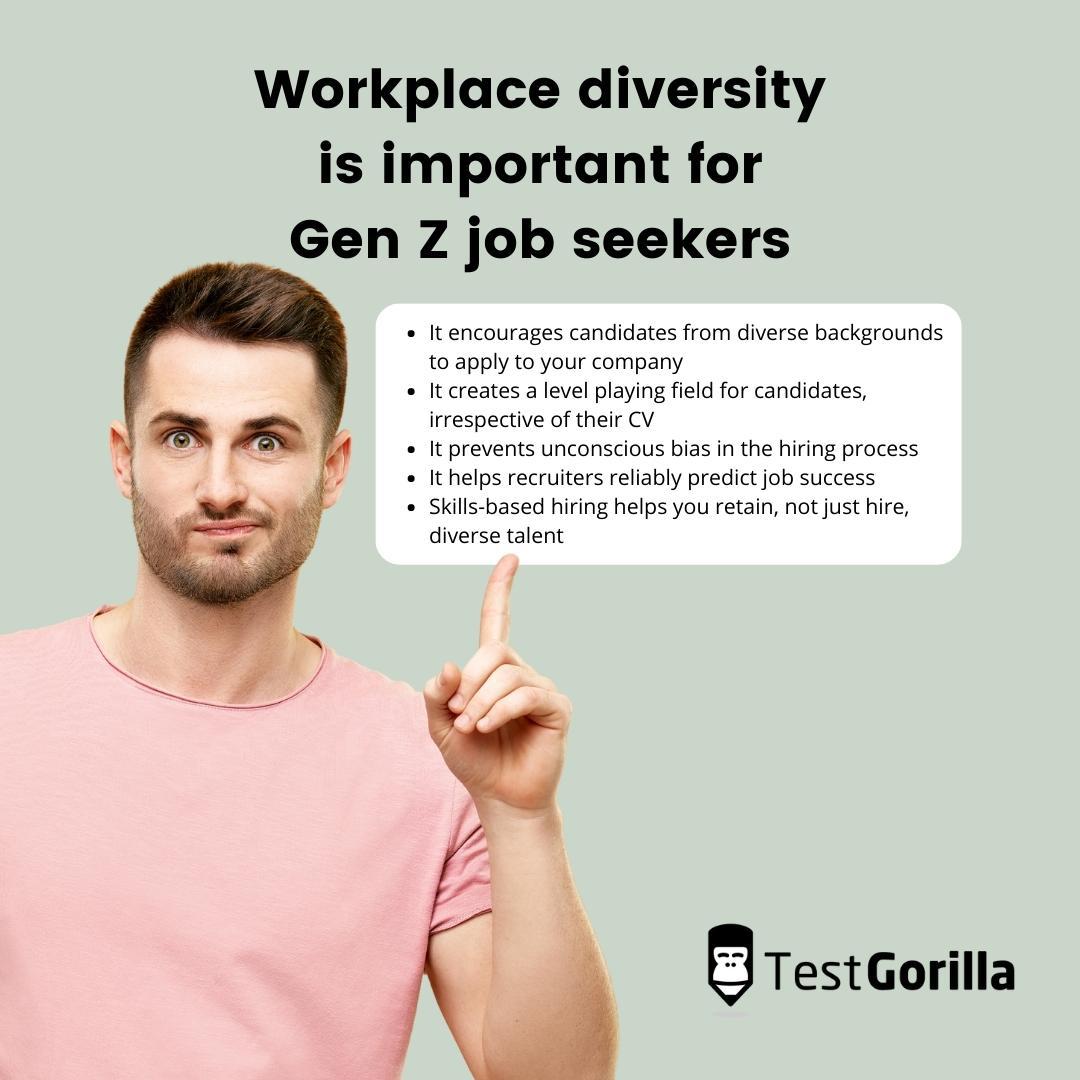“We’re an equal opportunity employer and do not discriminate…”
It’s not enough for businesses to merely state their commitment to diversity and inclusion at the end of a job description. They need to walk the walk if they’re looking to win the trust of the latest generation to join their workforce – Gen Z.
Gen Z will make up 27% of the workforce by 2025. And in one Gen Z survey, as many as 55% said a commitment to diversity and inclusion was important to them when evaluating a potential employer.
Conventional hiring practices – like filtering candidates based on a resume – are a barrier to building a diverse workforce. The best way to attract, hire, and retain diverse candidates is skills-based hiring, as it’s free of bias and gives an equal opportunity to all applicants.
In skills-based hiring, applicants complete different skills tests based on the job they’ve applied to. Top candidates are then invited to the next stage of the selection process, such as an in-person or video interview.
Let’s understand how skills-based hiring boosts workforce diversity.
Table of contents
- It encourages candidates from diverse backgrounds to apply to your company
- It creates a level playing field for candidates, irrespective of their resume
- It prevents unconscious bias in the hiring process
- It helps recruiters reliably predict job success
- Skills-based hiring helps you retain, not just hire, diverse talent
It encourages candidates from diverse backgrounds to apply to your company
In a 2020 Gen Z survey about diversity and inclusion, one in three respondents admitted to not applying for a job because they feared discrimination and unfairness. A job description focused on skills shows potential applicants you’re most interested in their competence for the job, not their racial or gender identity, past employers, or education.
Consider two hypothetical job descriptions:
“We’re looking for an applicant with XYZ skills for a role. To apply, take our skills assessment. We’ll get in touch with the top five candidates for an interview.”
“We’re looking for an applicant with XYZ educational qualifications and work experience for a role. Submit your resume to apply.”
In the first instance, the applicants are assured selection is based on their ability to complete the tasks required of the position. In the second instance, applicants might still be skeptical as resumes reveal their names and identity, along with qualifications and experience. Thus, diverse candidates might be more likely to apply to the first job than the second.
It creates a level playing field for candidates, irrespective of their resume
Minorities and low-income groups often lack access to top educational institutions or even opportunities to complete higher education. This puts them at a disadvantage in a resume-based hiring process that prioritizes credentials and work experience. Skills-first hiring helps minorities and low-income groups showcase their skills and get jobs, irrespective of their formal education level or where they’ve acquired experience.
With the help of open online learning platforms, candidates can acquire skills needed at a fraction of the cost of a four-year university education. Massive open online course (MOOC) platforms like Coursera and EdX offer courses in coding, writing, marketing, customer service, and HR at a nominal fee. Even video platforms like YouTube and Instagram have tutorials for free.
Additionally, some skills are easily transferred from one job to another and don’t require students to attend a formal program. A software engineer, for example, might also have the skills for a technical writing job. Skills-based assessments are the best way to gauge applicants’ proficiency for a job.
It prevents unconscious bias in the hiring process
The conventional hiring process offers multiple points of bias, as hiring managers can see applicants’ names and identities. Candidates are unfairly discriminated against based on gender, nationality, ethnicity, and school. One Harvard Business Review study found female and minority candidates still need higher GPAs than white males to receive the same preference from hiring managers. Thus, even GPA scores are susceptible to bias.
In skills-based hiring, HR managers first see candidates’ test scores and not their name, identity, education, or past employment history. This minimizes hiring managers’ personal biases.
It helps recruiters reliably predict job success
Some job descriptions come with unnecessary requirements or success predictors, like a specific nationality – asking for native English speakers – or work experience – expecting 10 years of experience in developing enterprise applications – which bar everyone who doesn’t meet the criteria from applying.
However, being a native English speaker doesn’t guarantee great writing or communication skills. Similarly, years of experience in a specific coding language can also be a poor proxy for success as a developer because coding is a fast-changing field.
Skills-focused tests showcase candidates’ capabilities first-hand rather than having hiring managers make guesses based on past experience, education, or even nationality. Thus, diverse candidates that look less than ideal on paper but are perfect for a role also have a shot at winning jobs.
Skills-based hiring helps you retain, not just hire, diverse talent
Hiring diverse candidates is only the first step to boosting diversity in your organization. To reap the benefits of a diverse team like innovation, you’ll also need to retain employees. Notably, skills-based hiring helps with employee retention too.
Our State of Skills-based Hiring report shows that skills-based hires are happier and stay longer in their roles than others. Skills-based tests give employees a glimpse into the exact type of work they’ll perform in a job, rather than getting a job and realizing it’s not what they were looking for.
TestGorilla offers multiple screening tests in coding, writing, and marketing to help you hire the perfect candidate for a role, irrespective of gender, nationality, or ethnicity. Through our skills-based tests, candidates can also get an idea of what they’re signing up for.
Try TestGorilla for free to see how it works, and start building a diverse team.
Related posts
Hire the best candidates with TestGorilla
Create pre-employment assessments in minutes to screen candidates, save time, and hire the best talent.
Latest posts
The best advice in pre-employment testing, in your inbox.
No spam. Unsubscribe at any time.

Hire the best. No bias. No stress.
Our screening tests identify the best candidates and make your hiring decisions faster, easier, and bias-free.
Free resources
This checklist covers key features you should look for when choosing a skills testing platform
This resource will help you develop an onboarding checklist for new hires.
How to assess your candidates' attention to detail.
Learn how to get human resources certified through HRCI or SHRM.
Learn how you can improve the level of talent at your company.
Learn how CapitalT reduced hiring bias with online skills assessments.
Learn how to make the resume process more efficient and more effective.
Improve your hiring strategy with these 7 critical recruitment metrics.
Learn how Sukhi decreased time spent reviewing resumes by 83%!
Hire more efficiently with these hacks that 99% of recruiters aren't using.
Make a business case for diversity and inclusion initiatives with this data.




















